|
|
|
Sort Order |
|
|
|
Items / Page
|
|
|
|
|
|
|
| Srl | Item |
| 1 |
ID:
106786
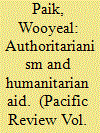

|
|
|
|
|
| Publication |
2011.
|
| Summary/Abstract |
Severe natural disasters encourage the international community to donate humanitarian aid (materials and personnel) to the affected country, which is critical for its human security. Some authoritarian regimes, however, rationally reject such aid despite the dire situation of their people. When an authoritarian regime decides whether to accept foreign humanitarian aid for severe natural disasters or not, it considers two political factors: (1) the risk and (2) the need to accept aid, which is a type of exogenous shock that may threaten the stability of the regime and its survival. This paper considers the factors of risk (regime type, domestic struggle, and international pressure) as inherent and contingent determinants of regime stability, and the need factors by looking at the different types of sources from which the regime gains its legitimacy (electoral mandate, economic development, or ideology). If the risk is less and the need is more, the regime is more likely to accept the aid, otherwise not. The two authoritarian regimes hit by severe natural disasters - the 2008 Sichuan earthquake in China and the 2008 Cyclone Nargis-caused floods in Myanmar - are considered as salient cases for the external variation between authoritarian regimes. This paper also finds some critical internal variation within an authoritarian regime and its differing responses during the 2008 Sichuan earthquake and two other disasters - the 1976 Tangshan earthquake and the 2010 Qinghai earthquake.
|
|
|
|
|
|
|
|
|
|
|
|
|
|
|
|
| 2 |
ID:
163467
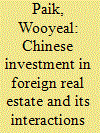

|
|
|
|
|
| Summary/Abstract |
Since the early 2000s, a great tide of Chinese "go outside" (zouchuqu), or outbound foreign investment, has happened in many regions and industries of the world. Among these, real estate has emerged as one of the most rapidly increasing outbound investments from China in the 2010s. As a result, Chinese investors, both enterprises and individuals, have had an extensive and growing impact on host states and societies, which are largely developed and democratic. This study analyzes the multifaceted interactions between Chinese foreign real-estate investors and host states and societies using the case of Jeju Province in South Korea from 2010 to 2018. More specifically, it analyzes the responses of the host country's national and local governments, as well as its grassroots civil society, to the soaring and often unconstrained Chinese investment in its real estate, focusing on the role of a host country's democratic institutions.
|
|
|
|
|
|
|
|
|
|
|
|
|
|
|
|
| 3 |
ID:
136182
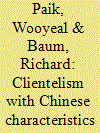

|
|
|
|
|
| Summary/Abstract |
WOOYEAL PAIK and RICHARD BAUM argue that a growing number of Chinese feel frustrated by and alienated from local government agencies. They argue that clientelist alliances constitute a growing threat to the stability of the Chinese Communist party.
|
|
|
|
|
|
|
|
|
|
|
|
|
|
|
|
| 4 |
ID:
148240
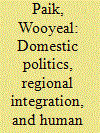

|
|
|
|
|
| Summary/Abstract |
This paper tries to explain the evolving relations between the recent domestic political changes in Myanmar and the role of regional integration as they affect human rights in Myanmar. I posit that the two most important causes of the humanitarian crisis in Myanmar are the survival of the authoritarian regime and ethnic-religious conflicts. Those causes differ in nature and their political interactions with the ASEAN regional integration. This paper first examines the relationship between authoritarian regime survival and the humanitarian crisis/efforts during the 2008 natural disaster of cyclone Nargis and the resultant flooding. Second, I investigate the political dynamics of the human rights violations of ethnic and religious minorities, especially the Rohingya Muslim minority in the Rakhine State, during Myanmar’s recent democratic transition. This study approaches the aforementioned questions from both the EU and ASEAN perspectives and also deals with these two regional organizations’ interactions regarding Myanmar’s human rights.
|
|
|
|
|
|
|
|
|
|
|
|
|
|
|
|
| 5 |
ID:
110014
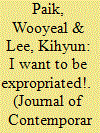

|
|
|
|
|
| Publication |
2012.
|
| Summary/Abstract |
This paper analyzes the 'Minor Property Housing' (XCQF) phenomenon. XCQF is an illegal residential building, constructed on rural collective land in suburban areas by a joint land development of township and village governments, land developers, and peasants for selling and renting to non-local urbanites. We argue that XCQF became a fait accompli not to be demolished nor legalized by higher authorities because the interests of lower-level governments and those non-elites converge. As a result, they jointly defy the central government and higher-level governments' land policies. It brings a rare opportunity for grassroots officials, entrepreneurs, and ordinary citizens to find a manner of co-existence, shaping this positive-sum coalition game unlike the near zero-sum game of other exploitative land developments. The XCQF phenomenon suggests that other patterns of coalition building, beyond what is in the current literature of 'rightful resistance', exist.
|
|
|
|
|
|
|
|
|
|
|
|
|
|
|
|
| 6 |
ID:
161568
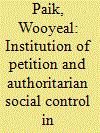

|
|
|
|
|
| Summary/Abstract |
This paper discusses the Xinfang institution of petitions (letters and visits) and explores the ways in which the Chinese Communist Party regime utilizes social control mechanisms to identify, oversee, and suppress socially discontented people with grievances in the post-Mao market reform era. This public-facing institution for managing participation and rightful resistance, which aims to oversee local officials and redress mass grievances, also plays an unexpected role in social control. Unlike the social control exercised by police patrols in police states, Xinfang functions first as a “fire alarm” in this authoritarian regime; then, if necessary, as a selective “police patrol,” collecting information on discontented people with grievances, monitoring them, quelling and even preempting their protests, and referring dangerous petitioners to higher levels of government to prevent disruption in politically critical regions. This argument is supported with a detailed institutional analysis of the nationwide structure of Xinfang and several case studies of Xinfang’s multi-layered response to petitioners to Beijing, during the Falun Gong incidents in 1999 and 2000 in particular. Several complementary case studies on the behavior of local petition mechanisms and statistical evidence are also analyzed.
|
|
|
|
|
|
|
|
|
|
|
|
|
|
|
|
| 7 |
ID:
141104
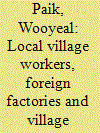

|
|
|
|
|
| Summary/Abstract |
In market reform China, contentious and unfair labour relations between vulnerable migrant workers and exploitative foreign factory owners are one of the most critical issues of the political economy. This article analyses another group of workers – non-migrant local village workers – who protect themselves from foreign employers using two political resources: collective land-use rights and local political organizations, such as village governments, affective networks and physical forces, during their suburban village's industrialization. Based on intensive ethnographic fieldwork in Shandong (Qingdao) and other coastal regions in 2007, 2008 and 2011–2013, this article attempts to answer the questions of how local village workers protect their labour rights without reliable trade unions or rigorous governmental protection. How can villagers protect, if not maximize, their interests in their relations with the foreign factories in their villages? It also contrasts local labour relations in Qingdao with migrant labour relations in other coastal regions.
|
|
|
|
|
|
|
|
|
|
|
|
|
|
|
|
| 8 |
ID:
171025
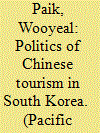

|
|
|
|
|
| Summary/Abstract |
The politics of tourism has not been studied in depth, even though many recognize the growing importance of political factors in tourism economy. As China has risen, it has used its massive volume of outbound tourists and its tourist industry for political gain, with both positive and negative consequences for partner countries. And the recipient countries’ state and society respond to these external impacts from China in various ways. In recent years, this development has alarmed students of tourism and politics in the Pacific Basin. In this context, the case of Chinese tourism in South Korea throughout 2010s sheds light on many aspects of this new and controversial phenomenon and ensuing interactions of various actors at both domestic and international political arenas.
|
|
|
|
|
|
|
|
|
|
|
|
|
|
|
|
| 9 |
ID:
178697
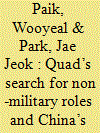

|
|
|
|
|
| Summary/Abstract |
The Quadrilateral Security Dialogue (‘Quad’)—a cooperative consisting of the US, Japan, Australia, and India—has re-emerged since 2017 after a decade of dormancy. After typologizing the minilateral security cooperation’s goals and its expansion, this article explains that the current Quad is an expanded minilateral cooperation of the existing various security bilaterals and trilaterals among its member states. This minilateral has increased its non-military cooperation, focusing on infrastructure-building to counter that of China’s Belt and Road Initiative in the Indo-Pacific region. It also examines how China has been responding to this line of the Quad’s economic responses, while China is cautious about the Quad’s security implications. It concludes with some predictions as to how this set of interactions is likely to influence the regional order.
|
|
|
|
|
|
|
|
|
|
|
|
|
|
|
|
|
|
|
|
|